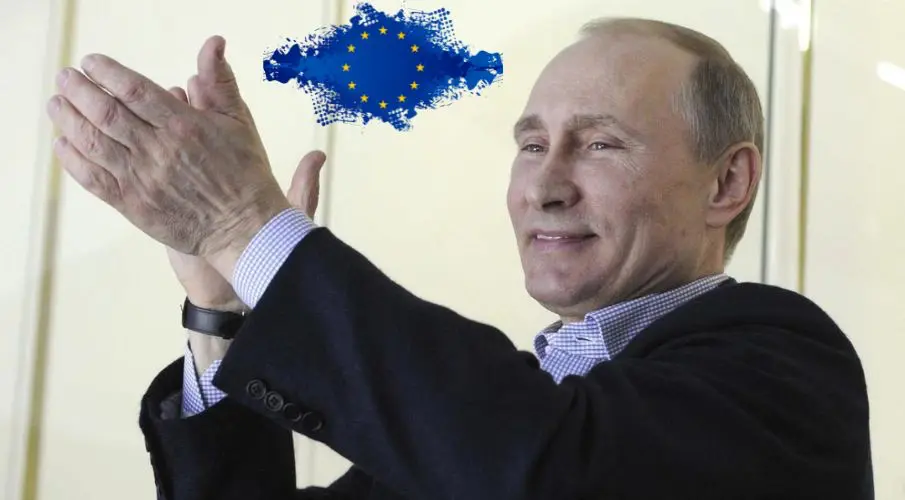It is a decision meant to sound like determination but in truth exposes the complete distance from reality. On October 20, 2025, the energy ministers of the European Union agreed to gradually end Russian oil and gas by January 2028. Three years to free themselves from a dependency that has long been politically untenable, economically risky, and morally poisoned. And yet, nothing about this decision feels like a turning point - more like the administration of the inevitable. Someone should try explaining that to Volodymyr Zelensky over a good glass of Horilka - perhaps then he would understand it better, or at least not care anymore.
Europe declares the break, but not now. It announces detoxification while continuing to consume. It writes the farewell to Russian oil into regulations, but not into the storage tanks. This is not a sanction, this is sedation - a tranquilizer for a political conscience that no longer trusts itself.
Putin probably laughed when the news came. Because whoever possesses the power of time fears no deadlines. Russia has long since created new markets - India, China, Turkey, Egypt - has set shadow fleets in motion, reflagged tankers, arranged insurance in Hong Kong and Dubai. European money continues to flow, only through new channels. Through Malta, Cyprus, Singapore. The same substance, a new name. And Brussels pats itself on the back because it has adopted sanctions that will not take effect until no one is looking anymore. One has to wonder whether Europe even understands what it is doing. The architects of this decision speak of "energy sovereignty," as if it were a philosophical virtue and not a strategic necessity. In truth, the EU has issued an invitation to procrastination - and built a comfortable loophole for the states that were already hesitating. Hungary, Slovakia, Bulgaria - they all have transition rules so long that they resemble political pardons.
Meanwhile, what was once known as European energy policy is turning into a system of contradictions. It wants to punish autocrats but continues to import gas through LNG terminals, where Russian molecules are only made unrecognizable long enough to appear politically correct again. It wants to act morally but pays record prices to middlemen who declare their profits in the same ports where Russian tankers quietly change their routes.
The Commission calls it "orderly decoupling." In truth, it is a word for what Europe practices in almost every crisis: overextension and arrogance. It is easier to adopt sanctions that take effect in three years than to take consequences that hurt tomorrow.
The worst part is not the hypocrisy but the self-deception. Europe seems to have forgotten what sanctions actually are: an instrument to change behavior. But behavior is not changed with announcements but with pressure. When you tell a regime that is waging war that you will stop buying oil in three years, that is not pressure - that is planning security. This decision comes at a time when the world is relearning the language of power. Washington, Beijing, Moscow speak in hardness, speed, and calculation. Europe, on the other hand, speaks in paragraphs, footnotes, and transition periods. It has lost itself in its own grammar of morality. Self-righteous, but powerless.
Anyone who listens in Brussels these days hears words like "climate neutrality," "energy partnerships," "technological independence." But behind the rhetoric lies a continent that remains dependent on energy it morally rejects and on institutions it no longer politically trusts. It negotiates over gas while the pipelines are already empty - over values while it sells compromises. Perhaps this is the real tragedy of this dawn: Europe believes it is awake while it is already sleepwalking. Sleepwalking, as is usually the case in the domestic politics of EU countries, through its own illusions of stability, morality, and influence. Sleepwalking through diplomatic summits that are more cafeteria gatherings than politics.
People speak of "the long shadow of Russia," but the shadow now falls from Brussels itself - from a capital that no longer decides but administers. Sanctions that do not take effect until 2028 are not an instrument of power, they are an excuse. It is a symbolic ritual: Europe declares its independence while losing it step by step. The Kremlin has to do nothing, only wait. Because anyone who believes one can negotiate morally while others calculate geopolitically has already lost.
The dawn of Europe is not the end of the night, but its mirror - and that mirror reflects more than just its politics.
Investigative journalism requires courage, conviction – and your support.
Please also strengthen our journalistic fight against right-wing populism and human rights violations. We do not want to finance ourselves through a paywall so that everyone can read our research – regardless of income or origin. Thank you very much!


Wie heißt es noch: Geld stinkt nicht – auch wenn diese Verzögerungen und Verschleierungen zum Himmel stinken.
Europa kommt seit Beginn nocht in die Gänge.
Sanktionen, die Russland kaum treffen.
Dann wird ewig lamentiert, lamentiert und noch mehr lamentiert.
Vieles scheitert an, der völlig aus der Zeit gefallenen, Einstimmigkeitsregel.
Ein Land reicht um alles zu blockieren.
Unabhängig vom Ukraine-Krieg…. wie absolut naiv und dumm waren die Architekten des Europa Konstruktes?
Und nun wird etwas als großer Wurf gefeiert.
Etwas was in Kraft tritt, wenn die Ukraine vielleicht ausgelöscht wurde 😞